Effective sanctions over 15,000 "sanctions against superpowers" may push themselves into a desperate situation.
"The increasing blockade and sanctions imposed by the United States have caused Cuba’s current economic difficulties. But Cuba will not wait for the enemy to correct its criminal policy. Cuba must persist in its efforts and seek ways to overcome US sanctions and blockades with wisdom, dedication and creativity. "
On July 26th, local time, Cuban Vice President Valdez made the above statement at the commemoration of July 26th National Uprising Day in the country.
More than 60 years ago, the United States broke off diplomatic relations with Cuba after the revolution, and then began a long blockade of this socialist country. In the American think tank — — According to the Center for Economic Policy Research, the US sanctions against Cuba are the "oldest and most restrictive" of all existing economic pressure mechanisms.
In a recent report, the think tank pointed out that although the government has made some progress in restoring diplomatic relations with Cuba and relaxing certain trade restrictions, these measures have basically been completely reversed during the government’s term of office. After the Biden administration came to power, it still maintained most of the policies toward Cuba during the Trump era.
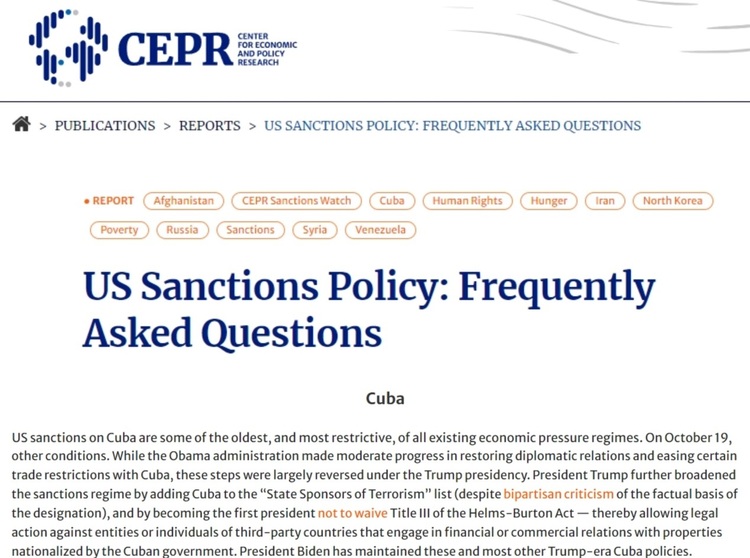
Screenshot of official website, Center for Economic Policy Research in the United States
Decades of harsh blockade have seriously affected Cuba’s economic development and people’s lives. For nearly 30 years, the United Nations General Assembly has passed a resolution every year demanding that the United States end its blockade of Cuba. However, in the face of the world’s just voice, the United States still goes its own way.
Even many American politicians are increasingly worried that the "sanctions superpower" of the United States will eventually push itself into a desperate situation.
Sanctions target: more than the world60%Low-income countries and regions
Washington post recently published a long investigative report, pointing out that sanctions have become a key tool of American foreign policy.
Up to now, the United States has imposed unilateral sanctions on one third of the countries in the world, with more than 15,000 effective sanctions, ranking first in the world, and far ahead of other countries and organizations.
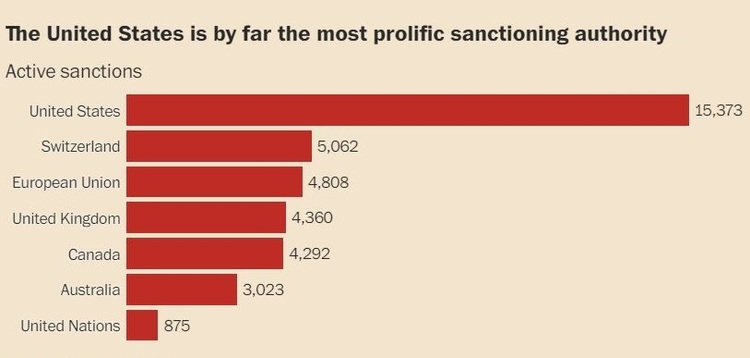
Washington post chart
The survey found that the number of targets sanctioned by the United States has increased dramatically in recent presidents, especially Trump and Biden.
Since the beginning of this year, the US government has continued to introduce sanctions at a record speed. Washington post’s analysis based on the income data summarized by the World Bank shows that more than 60% of low-income countries and regions in the world are suffering from some kind of sanctions imposed by the US government.
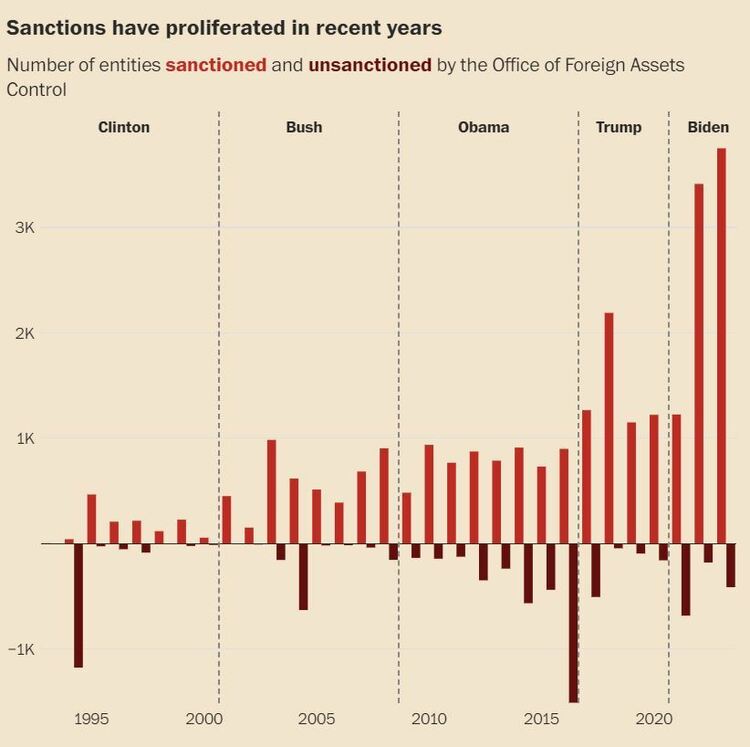
Washington post chart
According to the report of the Center for Economic Policy Research in the United States, the evidence that unilateral economic sanctions have caused serious harm to civilians around the world is "overwhelming".
As we all know, extensive sanctions will hinder the overall economic growth of a country, and sometimes lead to or prolong the economic recession or even depression of the target country. Sanctions also hinder the target countries from obtaining necessities such as food, energy and medicine, hinder humanitarian assistance, and thus create more poverty, hunger, disease and a large number of avoidable deaths.

Screenshot of official website, Center for Economic Policy Research in the United States
This report specifically mentions that the legitimacy of American unilateral sanctions has been widely questioned by the international community.
Some people think that only the UN Security Council has the right to legally impose sanctions. On the contrary, any unilateral sanctions or multilateral sanctions without the approval of the Security Council violate the principle of national sovereignty and undermine the international rule of law.
At the same time, the unilateral economic sanctions imposed by the United States also violate the spirit of multilateral documents such as the Charter of the Organization of American States, which the United States itself participated in.
In addition, many economic sanctions imposed by the United States also violate international human rights law and a series of treaty obligations, including the Vienna Declaration and Programme of Action and several resolutions of the United Nations Human Rights Council.
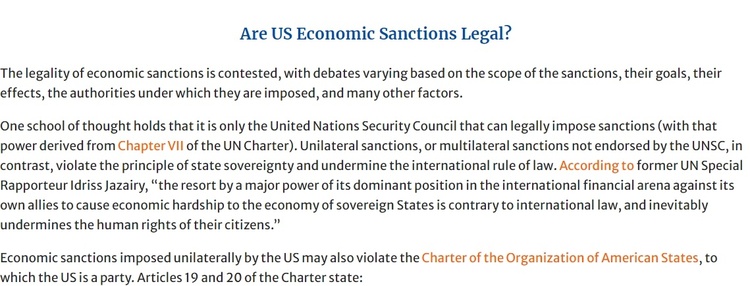
Screenshot of official website, Center for Economic Policy Research in the United States
More importantly, many US sanctions are based on unreliable domestic laws. Most of them are implemented according to the International Emergency Economic Powers Act of 1977, which gives the U.S. government the power to determine that a specific country "poses a special threat to U.S. national security, foreign policy or economy."
However, the above report pointed out that in many cases, such statements — — For example, the political situation in Venezuela or Zimbabwe poses an "extraordinary threat" to American national security to some extent — — There is almost no basis.

Screenshot of official website, Center for Economic Policy Research in the United States
Must we choose it between diplomacy and war?
More and more illegal unilateral sanctions are not only being scolded constantly, but also their actual effects are seriously in doubt.
American sanctions against Cuba, Iran and North Korea have been going on for decades, but it has been proved that these countries have never given in, although they have been greatly hurt by sanctions.
The latest example is Russia.
After the outbreak of the conflict between Russia and Ukraine, the United States led western allies to impose more than 16,000 sanctions on Russia in order to effectively reduce Russia’s "war resources". But more than two years later, both on the battlefield and economically, the western abacus of "making Russia" has almost disappeared.

Screenshot of BBC report
To the west’s surprise, Russia’s economy not only grew significantly by 3.6% last year, but also seems to continue to maintain a strong growth momentum.
The latest World Economic Outlook report released by the International Monetary Fund (IMF) predicts that Russia’s economic growth rate will exceed that of all developed economies including the United States this year. It is estimated that Russia’s gross domestic product (GDP) will increase by 3.2% and 1.8% respectively this year and next, both higher than previously expected.

AFP report screenshot
Former official of the US Department of Commerce, currently working for a Washington think tank — — Bill Reinsch, an international business expert at the Center for Strategic and International Studies, said that sanctions "as the only thing between diplomacy and war" have become the most important foreign policy tool of the United States. "However, no one in the (American) government can be sure whether the whole sanctions strategy will work."
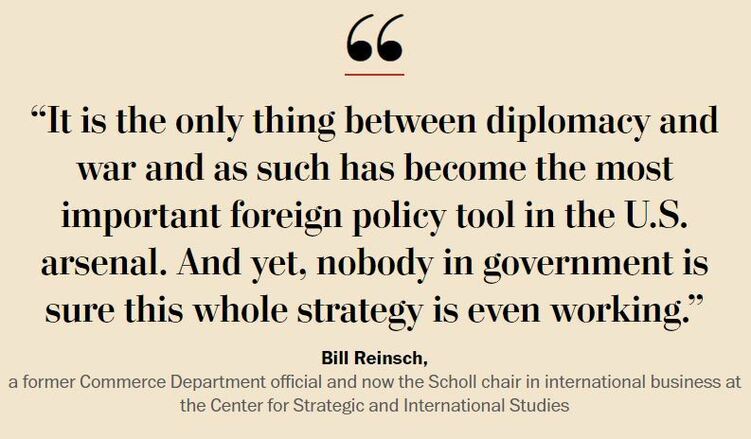
Screenshot of Washington post report
What is more terrible than this embarrassment is the anti-bite effect of American unilateral sanctions.
Washington post reported that since financial sanctions became a new tool of American unilateral sanctions with the help of dollar hegemony, American policy makers began to use this power more and more frequently.
However, with the increasing sanctions, challenges have emerged. Not only Wall Street and America’s European allies may be hurt by secondary sanctions, but also more countries are looking for ways to get rid of dollar dependence in order to avoid sanctions, which leads to the gradual erosion of dollar hegemony.
A poll earlier this year found that most Americans believe that if American sanctions violate international law, interfere with humanitarian assistance, damage the livelihood of ordinary people, or hinder climate change cooperation between countries, the United States should cancel these unilateral coercive measures.
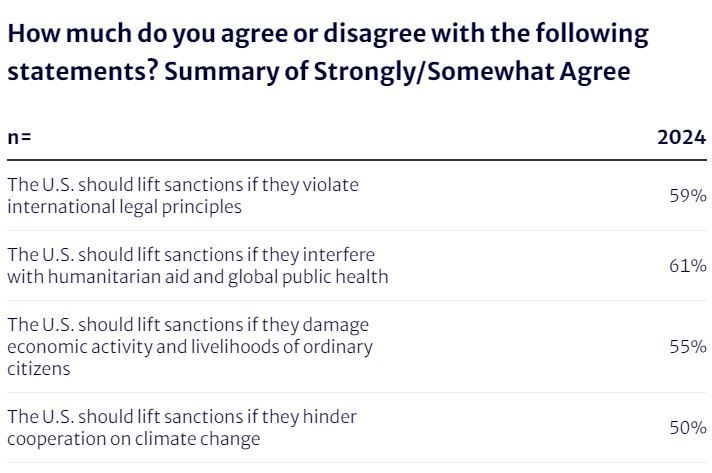
Screenshot of official website, Center for Economic Policy Research in the United States
Even some people at the top of the US government have realized the risk of abusing unilateral sanctions.
Jacob Lew, the US Treasury Secretary during the Obama administration, publicly warned that the excessive use of unilateral sanctions must be curbed, because it "may eventually weaken our ability to implement effective sanctions".

Screenshot of Washington post report